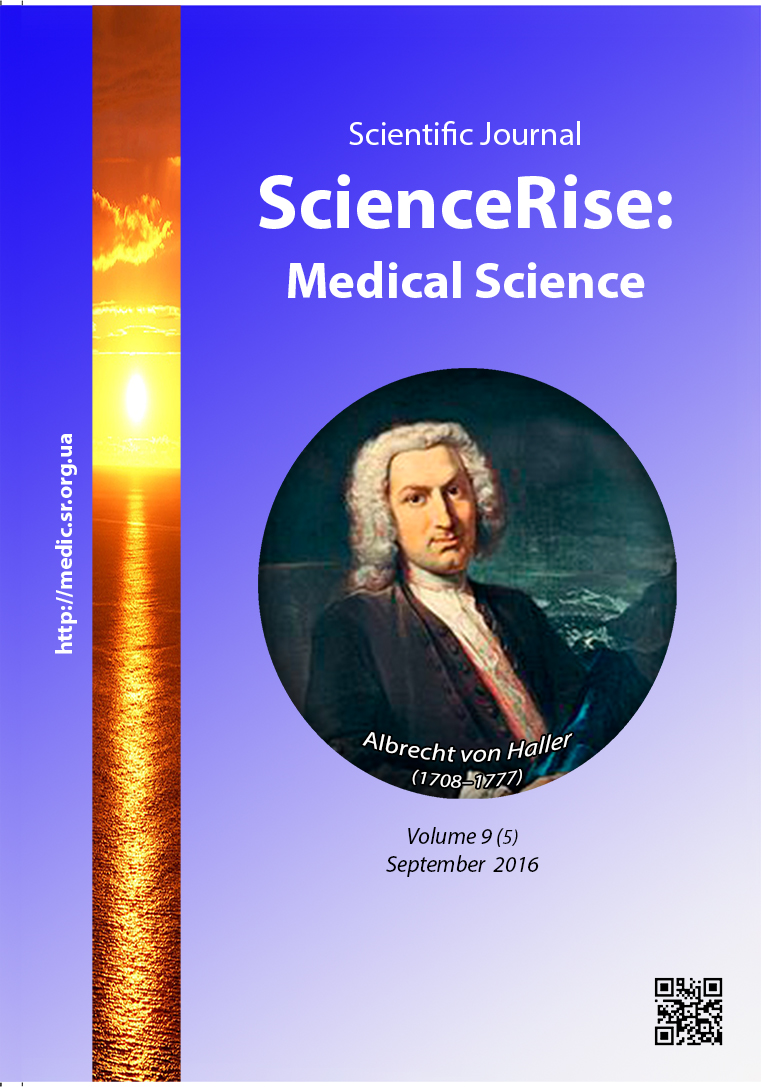The grounding of general and differentiated approaches to the complex treatment-rehabilitation help to co-dependent family of men with alcoholic addiction
DOI:
https://doi.org/10.15587/2519-4798.2016.78013Keywords:
family maladjustment co-dependence, wives, alcoholic addition, complex treatment-rehabilitation helpAbstract
Aim – The grounding of general and differentiated approaches to the complex treatment-rehabilitation help to co-dependent family of men with alcoholic addiction (AA).
Contingent. 160 men with AA and their wives and also 50 married couples, women, whose husbands had not alcoholic problems.
Methods. Clinical-psychopathological and psychodiagnostic using the battery of AUDIT-like tests, elaborated by the composite authors under the guidance of I.V. Linsky and also the scales of anxiety and depression of M. Hamilton HDRS and HARS, the scale of assessment of psychosocial stress level of L. Reader and the methodology of determination of stress-resistance and social adaptation of Holms and Rahe. Psychosocial features of functioning of women were studied by psychodiagnostic method using the methodology of “Determination of subjective control level” of J. Rotter (in adaptation of E. F. Bagin) and questionnaire “The methods of overcoming behavior” of S. Folkman, R. Lazarus (in adaptation of L. I. Vasserman, E. A. Trifonova); the features of family functioning, inherent to examined persons, were established using methodology of “Analysis of family anxiety” of E. Eidemiller, B. Yustitskis and the scale of structural interview for identification of family type of V. A. Abramov and co-authors.
Results. The aim of complex treatment-rehabilitation help for co-dependent family is an activation of the resource adaptive possibilities of the family and formation of the ability in men in women to solve the private and family problems (of alcoholic and non-alcoholic genesis) independently.
The main directions, additional foundations, principles and conditions of realization of the complex treatment-rehabilitation help to co-dependent family were determined. The algorithm of its use was created.
Psychotherapeutic component of treatment-rehabilitation process was characterized. It was accented, that psychotherapeutic work with co-dependent wives of patients with AA must have more differentiated character and be individualized, depending, first of all, on the clinical variant of women’s existent maladjustment and the type of family maladjustment co-dependence (FMC). The given parameters become the main criteria of differentiation of psychotherapeutic influences at determination of the content filling of psychotherapeutic interventions and also “sensitivity” to the different psychotherapeutic techniques.
Conclusions. The positive result of introduction of this system becomes possible not only at the expense of using the treatment-rehabilitation influences but also in connection with positive changes of social and family relations of women (acceptance of social environment (context), where she lives and functions)References
- Bisaliev, R. V., Nekljudova, V. D., Kubekova, A. S. (2012). Sozavisimoe povedenie kak psihopatologicheskij fenomen: konceptual'noe videnie problemy. Vedaa technologie: krok do budoucnosti. Praha, 74–77.
- Jaryj, V. V. (2015). Spivzalezhnist' u rodynah hvoryh na psyhichni i povedinkovi rozlady vnaslidok vzhyvannja alkogolju: sfera kompetencii' narkologichnoi' dopomogy. Dovzhenkivs'ki chytannja: Redukcija vzhyvannja alkogolju – nova narkologichna paradygma. Kharkiv: Vydavnyctvo «Plejada», 272–274.
- Korostiy, V., Markova, M., Kozhyna, H., Gaponov, K., Lytvynenko, V. (2016). Neurobiological basis of mutual influence of stress burden and alcohol addiction: Review of data. European Psychiatry, 33, S302. doi: 10.1016/j.eurpsy.2016.01.1034
- Wegscheider-Cruse, Sh. (1989). Another Chance: Hope&Health for the Alcoholic Family. PaloAlto, Calif: Science & Behavior Booksinc, 324.
- Babor, T. F., Dolinsky, Z. S., Meyer, R. E., Hesselbrock, M., Hofmann, M., Tennen, H. (1992). Types of alcoholics: concurrent and predictive validity of some common classification schemes. Addiction, 87 (10), 1415–1431. doi: 10.1111/j.1360-0443.1992.tb01921.x
- Babor, T. F. (1992). Types of Alcoholics, I. Archives of General Psychiatry, 49 (8), 599. doi: 10.1001/archpsyc.1992.01820080007002
- Litt, M. D. (1992). Types of Alcoholics, II. Archives of General Psychiatry, 49 (8), 609. doi: 10.1001/archpsyc.1992.01820080017003
- Zav'jalov, V. Ju. (1988). Psihologicheskie aspekty formirovanija alkogol'noj zavisimosti. Novosibirsk: Nauka, 164–183.
- Linskij, I. V., Minko, A. I., Artemchuk, A. F. et. al. (2009). Metod kompleksnoj ocenki addiktivnogo statusa individa i populjacii s pomoshh'ju sistemy AUDIT-podobnyh testov. Visnyk psyhiatrii' ta psyhofarmakoterapii', 2 (16), 56–70.
- Linskij, I. V., Minko, A. I., Artemchuk, A. F. et. al. (2010). Addiktivnyj status i metod ego kompleksno jocenki pri pomoshhi sistemy AUDIT-podobnyh testov. Psihicheskoe zdorov'e, 6 (49), 33–45.
- Podkorytov, V. S., Chajka, Ju. Ju. (2003). Depressii (Sovremennaja terapija). Kharkov: Tornado, 350.
- Kornac'kyj, V. M., Markova, M. V., Stepanova, N. M., Babych, V. V. (2007). Ocinka psyhosocial'nyh chynnykiv ryzyku rozvytku hvorob systemy krovoobigu u pacijentiv pervynnoi' lanky medyko-sanitarnoi' dopomogy. Kyiv, 14.
- Rajgorodskogo, D. Ja. (Ed.) (2001). Prakticheskaja psihodiagnostika. Metodiki i testy. Samara: «Bahrah-M», 672.
- Vasserman, L. I., Iovlev, B. V., Isaeva, E. R. et. al. (2009). Metodika dlja psihologicheskoj diagnostiki sposobov sovladanija so stressovymi i problemnymi dlja lichnosti situacijami. Sankt-Peteburg, 33.
- Jejdemillera, Je. G. (Ed.) (2002). Sistemnaja semejnaja psihoterapija. Moscow – Kharkov – Minsk: «Piter», 83–95.
- Abramov, V. A., Zhigulina, I. V., Rjapolova, T. L. (2009). Psihosocial'naja reabilitacija bol'nyh shizofreniej. Doneck: Kashtan, 584.
- Lapach, S. N., Chubenko, A. V., Babich, P. N. (2000). Statisticheskie metody v mediko-biologicheskih issledovanijah s ispol'zovaniem Excel. Kyiv: Morіon, 320.
Downloads
Published
How to Cite
Issue
Section
License
Copyright (c) 2016 Володимир Володимирович Ярий

This work is licensed under a Creative Commons Attribution 4.0 International License.
Our journal abides by the Creative Commons CC BY copyright rights and permissions for open access journals.
Authors, who are published in this journal, agree to the following conditions:
1. The authors reserve the right to authorship of the work and pass the first publication right of this work to the journal under the terms of a Creative Commons CC BY, which allows others to freely distribute the published research with the obligatory reference to the authors of the original work and the first publication of the work in this journal.
2. The authors have the right to conclude separate supplement agreements that relate to non-exclusive work distribution in the form in which it has been published by the journal (for example, to upload the work to the online storage of the journal or publish it as part of a monograph), provided that the reference to the first publication of the work in this journal is included.









